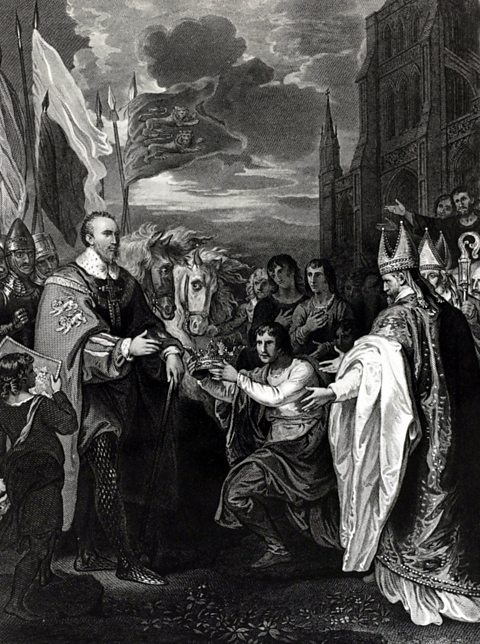The establishment of Norman rule over England

King William I's greatest concern immediately after his decisive victory at Hastings was to ensure he could consolidateMake more secure and or united. power over all of England.
The young Edgar Atheling, who was briefly crowned king after King Harold II's death, surrendered to William along with the Archbishop of Canterbury Stigand. This meant that the south of England was secure, but William was faced with the problem of asserting his authority over a foreign population.
How did William assert his authority?
- William let the Anglo-Saxon Earls of MerciaOne of the Anglo-Saxon kingdoms. and Northumbria, Edwin and Morcar, keep their lands because they had not fought against William at Hastings. The only condition was that they accepted WilliamÔÇÖs authority as king and as their feudal systemThe feudal system was a way of organising society into different groups based on their roles. It had the king at the top with all of the control, and the peasants at the bottom doing all of the work. lord.
- William transferred land ownership from the nobleSomeone of high rank with a title. who hadnÔÇÖt supported him to Norman baronA nobleman given land and power directly by the king or queen. who had. These were men he could trust and rely on.
- The greatest change introduced after the conquest of 1066 was the introduction of the feudal system. Norman feudalism was different from the Anglo-Saxon system in one important way - King William owned all of the land. William could now decide who to lease the land to.
The feudal system
The system of giving land in exchange for duties had existed before the Norman Conquest but William confiscated land from Anglo-Saxons, which created a whole new power structure. Norman feudalism was based on royal strength.
- The king owned all the land but gave some to the barons.
- The barons had to fight for the king and train knights for him. The knights then received some land from the barons.
- The villeinSomeone who worked without pay for their lord in return for land. worked on the land for the knights and barons. They paid them taxes and gave them some of their crops, as well as fines if they broke the law.
Odo and FitzOsbern
The majority of Normans were not given large territories, with the exception of Odo and William FitzOsbern.
| Background | Status after the conquest | |
| Odo | Odo was King WilliamÔÇÖs half brother. He was also the Bishop of Bayeux, he fought at Hastings and commissioned the Bayeux Tapestry to celebrate the conquest. | Odo became the Earl of Kent and grew very rich by seizing as much land as he could. King William trusted him and he ruled the south of England as a regent whilst the king was away in Normandy. |
| William FitzOsbern | FitzOsbern was related to King William and the two were close friends for many years. FitzOsbern was the brains behind the invasion - he ensured there were enough men and boats to conquer England. | FitzOsbern was a reliable military commander and he helped to consolidate King WilliamÔÇÖs power in central and western England. FitzOsbern became the Earl of Hereford, Worcester, Gloucester and Oxfordshire amongst others. FitzOsbern acted as regent alongside Odo during the kingÔÇÖs absence. |
| Odo | |
|---|---|
| Background | Odo was King WilliamÔÇÖs half brother. He was also the Bishop of Bayeux, he fought at Hastings and commissioned the Bayeux Tapestry to celebrate the conquest. |
| Status after the conquest | Odo became the Earl of Kent and grew very rich by seizing as much land as he could. King William trusted him and he ruled the south of England as a regent whilst the king was away in Normandy. |
| William FitzOsbern | |
|---|---|
| Background | FitzOsbern was related to King William and the two were close friends for many years. FitzOsbern was the brains behind the invasion - he ensured there were enough men and boats to conquer England. |
| Status after the conquest | FitzOsbern was a reliable military commander and he helped to consolidate King WilliamÔÇÖs power in central and western England. FitzOsbern became the Earl of Hereford, Worcester, Gloucester and Oxfordshire amongst others. FitzOsbern acted as regent alongside Odo during the kingÔÇÖs absence. |